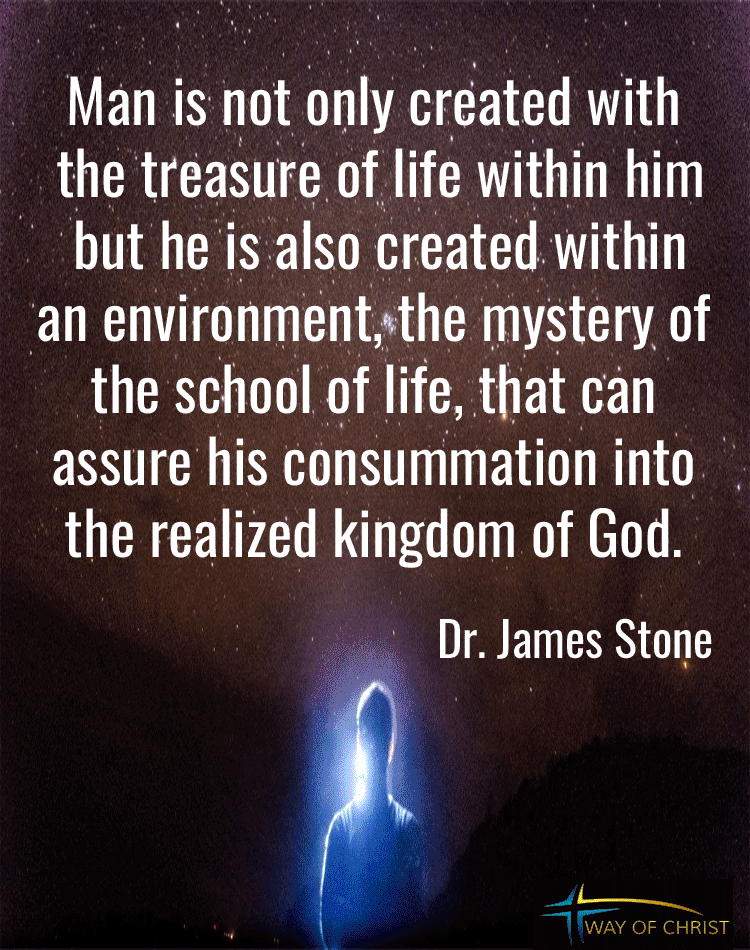Genesis 3 is the revelation of the final act of creation for man.

All of life is a school in which the Schoolmaster brings his charge to many glorious moments of graduations into the realized kingdom of God. It begins with a physical body consummating in the reality of a spiritual paradise. This institution of ever-higher learning brings the participants through a mysterious curriculum to acquired knowledge. From being completely vulnerable and not ashamed to covering, hiding, and blaming others, the unique human mind is taken through a challenging matriculation process (Genesis 3) to become finally the perfected crown jewel of all creation.
Beginning in innocence and inexperience, as a newborn, the thinking progression of the human mind travels a paradoxical course of action. The more it seeks to achieve its desires, the more impediments it encounters. Mysteriously, it is these hindrances in life that are necessary for man to come to experience the fullness of the life he desires.
The background for Genesis 3 is recorded in Genesis 1.
This mystery of man’s existence begins in the early pages of history. The author of Genesis 3 first recorded,
And God said, Let us make man in our image, after our likeness: and let them have dominion over the fish of the sea, and over the fowl of the air, and over the cattle, and over all the earth, and over every creeping thing that creepeth upon the earth. So God created man in his own image, in the image of God created he him; male and female created he them. And God blessed them, and God said unto them, Be fruitful, and multiply, and replenish the earth, and subdue it: and have dominion over the fish of the sea, and over the fowl of the air, and over every living thing that moveth upon the earth. And God said, Behold, I have given you every herb bearing seed, which is upon the face of all the earth, and every tree, in the which is the fruit of a tree yielding seed; to you it shall be for meat (Gen. 1:26-29).
Although the more intimate details of the existence of mankind would be later revealed (Genesis 2 and Genesis 3), from the beginning it is recorded that man would experience life as a spiritual being (image and likeness of God), a social creature (male and female), and a consuming organism (herbs and fruit for food).
Genesis 3 is founded in the three characteristics of all human beings.
These three characteristics of mankind is more easily seen in the record of Genesis 2. The author of Genesis 3 had previously recorded, “And the Lord God formed man of the dust of the ground, and breathed into his nostrils the breath of life; and man became a living soul“ (Gen. 2:7). For man to exist, since he is not The or an immortal spirit himself, God would have to give man a form out of the dusk of the ground. Since physical matter does not have life within itself, the breath of life, the Spirit of God, would then have to be breathed into this lifeless form enabling it to become a breathing creature, a living soul. Although man has a flesh and blood body, he is in essence a spiritual being experiencing life by the Spirit of God.
The author of Genesis 3 also reveals in Chapter 2 that man is not only a spiritual being but he is by creation a social creature. After God created the individual man and placed him in the beautiful, magnificent garden of Eden to live the days of his life, it is recorded that God said,
It is not good that the man should be alone; I will make him an help meet for him. And out of the ground the Lord God formed every beast of the field, and every fowl of the air; and brought them unto Adam to see what he would call them: and whatsoever Adam called every living creature, that was the name thereof. And Adam gave names to all cattle, and to the fowl of the air, and to every beast of the field; but for Adam there was not found an help meet for him. And the Lord God caused a deep sleep to fall upon Adam and he slept: and he took one of his ribs, and closed up the flesh instead thereof; And the rib, which the Lord God had taken from man, made he a woman, and brought her unto the man. And Adam said, This is now bone of my bones, and flesh of my flesh: she shall be called Woman, because she was taken out of Man. Therefore shall a man leave his father and his mother, and shall cleave unto his wife: and they shall be one flesh. And they were both naked, the man and his wife, and were not ashamed (Gen. 2:18-25).
From man’s inception survival in what it means to be a human being will require him, as the birth of a child, to enter into relationships with others or he dies. The therefore in “therefore shall a man leave father and mother and cleave unto his [woman, the actual word that gets translated wife], implies it is a divine imperative intrinsic in humanity that man enters into relations. Entering into a relationship with another is not only necessary for continual existence, but the interaction between the two participants is the only realm by which the fullness of life can be experienced. For example, one of the early followers of Jesus described the essence of being a true spiritual being as “. . . the fruit of the Spirit is love, joy, peace, longsuffering, gentleness, goodness, faith, Meekness, temperance . . . [notice, all characteristics of spirituality are relational terms]“ (Gal. 5:22-23).
The same early follower of Jesus simply ask this question, “For what is our hope, or joy, or crown of rejoicing?“ He, then, answers, “Are not even ye in the presence of our Lord Jesus Christ at his coming?“ Finally, he stated, “For ye are our glory and joy“ (1 Thess. 2:19-20). In the mystery of “it is not good that the man should be alone,“ man was created to be a social creature.
Finally, man is also a consuming organism, which is also clearly seen in Genesis Chapter 2:
And the Lord God took the man, and put him into the garden of Eden to dress it and to keep it. And the Lord God commanded the man, saying, Of every tree of the garden thou mayest freely eat: But of the tree of the knowledge of good and evil, thou shalt not eat of it: for in the day that thou eatest thereof thou shalt surely die (Gen. 2:15-17).
It should be obvious that matters of life and death, continual existence, hinges upon what man eats. In the temptation of Jesus to turn a stone into bread because he was hungry, his response was “man should not live by bread alone” (Luke 4:4). Although bread is not the essence of life, it is still necessary for the continual existence of life for man. In fact, when Jesus taught his disciples to pray, he entreated them to implore of the Father “give us this day our daily bread“ (Matt. 6:11).
For man to survive as a human being, he must continually digest nutritional food and drink. Indeed, most of man’s waking hours will be spent ultimately in the effort to put food on the table for consumption. By an act of creation, man was made to be a consuming organism.
Genesis 3 is the final act of revelation of creation for man.
This is the story of Genesis 3, the final act of revelation in the creation of man. The events of Genesis 3 are less a historical account of Adam and Eve interacting with the tree of the knowledge of good and evil and the consequences for doing so, than it is a magnificent metaphor of the events that transpire in the life of every human being. Although it is history, it is more a prognostication of all men. Every new-born human infant is susceptible to the same events that transpired in the life of Adam and Eve.
When the story is told and done, the creation of man, as a spiritual being, a social creature, and a consuming organism, is perhaps summarized best by one of the early disciples of Jesus:
For God, who commanded the light to shine out of darkness, hath shined in our hearts, to give the light of the knowledge of the glory of God in the face of Jesus Christ. But we have this treasure in earthen vessels, that the excellency of the power may be of God, and not of us (2 Cor. 4:6-7).
It is the excellency of the power of God that enables man to be a truly spiritual being, although he experiences this life in a flesh and blood body. It is the excellency of the power of God that can move man to a relationship of true love where the soul-satisfaction of another is greater than one’s own personal soul-satisfaction. It is the excellency of the power of God that brings man to know that man “does not live by bread alone.“
The struggle of being a spiritual being as opposed to being controlled by the flesh is conquered only by Jesus living in and through us. The struggle of enhancing others as opposed to using others to enhance ourselves is overcome only by the free-flow of the grace of God at work in us. The struggle of ambitiously hording bread to satisfy our personal hunger is defeated only by the Holy Spirit controlling us. The author of Genesis 3 expressed these powerful truths as “I will put enmity between thee [hissing whisperer] and the woman, and between thy seed and her seed; it shall bruise thy head, and thou shalt bruise his heel” (Gen. 3:15). Amazingly, we have this treasure of life in an earthen vessel that the excellency of the power may be of God and not of us not because man failed to live to his potential but simply because he was created to be so formed (Genesis 3).
Genesis 3 reveals the mystery of the school of life.
Man was created in such a way that before he could come to know, to appreciate, and to delight in the excellency of the power of God, being a true perfected spiritual being, he would first have to go through learning the consequences of fleshly living. Likewise, man was created to grow through the experiences of covering, hiding, and blaming of others before he could come to know, appreciate, and delight in the excellency of the power of God enabling him to be “naked and not ashamed.“ Finally, before man could come to know, to appreciate, and to delight in
Behold, I have given you every herb bearing seed, which is upon the face of all the earth, and every tree, in the which is the fruit of a tree yielding seed; to you it shall be for meat (Gen. 1.29),
he would have to experience
. . . cursed is the ground for thy sake; in sorrow shalt thou eat of it all the days of thy life; Thorns also and thistles shall it bring forth to thee; and thou shalt eat the herb of the field; In the sweat of thy face shalt thou eat bread (Gen. 3:17-19).
How else could man really know and understand the fullness of the glory of God unless he experiences that which is not glorious. A new-born baby is innocently experiencing the glory of the life of God but has no clue to just how glorious is the glory that is being experienced. Born with the capability to comprehend but without any or little comprehension, all of life is about the learning of just how precious and glorious the life of God is.
According to Genesis 3, man was not only created to experience the life of God but he was also formed in such a way that a matriculation process would be required to bring him finally to be the perfected crown jewel of all creation that he was intended to be. An early disciple of Jesus declared the essence of Genesis 3. Paul wrote to the Thessalonians,
. . . be not soon shaken in mind, or be troubled, neither by spirit, nor by word, nor by letter as from us, as that the day of Christ is at hand. Let no man deceive you by any means: for that day shall not come, except there come a falling away first, and that man of sin be revealed, the son of perdition; Who opposeth and exalteth himself above all that is called God, or that is worshipped; so that he as God sitteth in the temple of God, shewing himself that he is God (2 Thess. 2:2-4).
Before Christ can come “to shine out of darkness . . . in our hearts, to give the light of the knowledge of the glory of God . . .“ (2 Cor. 4:6), man must first “fall away“ from the innocence of being a new-born enfant. This matriculation process will always begin through the essence of what it means to be human: a spiritual being, a social creature, and a consuming organism.
Before a man can know, appreciate, and delight in the experience of the “prize of the high calling of God” (Phil. 3:14), the perfected crown jewel of all creation, he must first experience life being dominated by the flesh. He also must experience the misery that eventually comes from the using of others for his own benefit. He must also come to experience life as if the whole universe exists solely to meet his hunger and his thirst. In other words, to come finally to know, to appreciate, and to delight in the prize of the high calling of God, the uniqueness of the human mind must first “miss the mark and so not share in the prize” (2 Thess. 2:3). Man was created in such a way that before he can come to know, to appreciate, and to delight in being the perfected crown jewel of creation, man will have to learn first the fullness of the depravity that the human mind can become.
Paul could later say to the Thessalonians
. . . we are bound to give thanks alway to God for you, brethren beloved of the Lord, because God hath from the beginning chosen you to salvation through sanctification of the Spirit and belief of the truth: Whereunto he called you by our gospel, to the obtaining of the glory of our Lord Jesus Christ (2 Thess. 2:13-14).
In the final act of God in the creation of man, as the author of Genesis 3 recorded, “. . . he drove out the man; and he placed at the east of the garden of Eden Cherubims, and a flaming sword which turned every way, to keep the way of the tree of life“ (Gen. 3:24). Although man was created a spiritual being (Gen. 2:4-7), a social creature (Gen. 2:18-25), and a consuming organism (Gen. 2:8-17), he was also created that these essential characteristics of man could come to fruition only through the excellency of the power of God and not of man. It would be a hard lesson to learn but necessary if man would ever know, appreciate, and delight in being the perfected crown jewel of all creation, the celebrated recipient of the love of God.
Genesis 3 reveals the beginning of the matriculation process for man.
This learning process began, as recorded in Genesis 3, when
. . . the woman saw that the tree [of the knowledge of good and evil] was good for food, and that it was pleasant to the eyes, and a tree to be desired to make one wise, she took of the fruit thereof, and did eat, and gave also unto her husband with her; and he did eat (Gen. 3:6).
The thirst for wisdom is an inherent quality unique to the living human brain. As a newborn infant, who has the capability for comprehension but with little comprehension, the thirst for knowledge and wisdom will dominate the thinking processes of its entire life. This God-given attribute of being created as a human being, as opposed to being a beast of the field, is the touchstone, the arena, where all of life will be encountered. For example, it is ultimately not the physical circumstances that man faces but how he spiritual faces those circumstances that dictates the quality of his life. The challenges of the good life will always come from within the framework of the human thinking process.
From the innermost regions of the living human brain, there is a “hissing whisperer“ (Gen. 3:1), a God-given unique attribute of the human mind, that can have incredible influence over its thinking. Once experiencing the life-giving power of the Spirit of God, the physical brain, as if it has an inner mind of its own, will attempt to live in the illusion that the good life comes to fruition only through the sensing network of physical experiences. The human brain, being the unique brain of all creation, will develop through the thinking processes a tremendous thirst for greater wisdom thereby attempting to increase its own credibility and validity.
The author of Genesis 3 reveals this powerful challenge of the human mind in the revelation of the first struggle of created man. Much like the cry of the Psalmist, “Bless the Lord, O my soul: and all that is within me, bless his holy name. Bless the Lord, O my soul, and forget not all his benefits“ (Psalm. 103:1-2), there will always be the capability of an inner dialogue taking place within the thinking processes of man. Genesis 3 recorded,
Now the serpent [“a snake (from its hiss), that is, whisper a (magic) spell“] was more subtil than any beast of the field which the Lord God had made. And he said unto the woman, Yea, hath God said, Ye shall not eat of every tree of the garden? And the woman said unto the serpent, We may eat of the fruit of the trees of the garden: But of the fruit of the tree which is in the midst of the garden, God hath said, Ye shall not eat of it, neither shall ye touch it, lest ye die. And the serpent said unto the woman, Ye shall not surely die: For God doth know that in the day ye eat thereof, then your eyes shall be opened, and ye shall be as gods, knowing good and evil (Gen. 3:1-5).
What else could man do when Eve saw that the tree of the knowledge of good and evil was “good for food, and that it was pleasant to the eyes, and a tree to be desired to make one wise“ (Gen. 3:6)? As a baby which has the capability for comprehension but with little or any comprehension, the thirst for experiencing life, experiencing knowledge and wisdom, will always be an intrinsic part of man’s thinking. Since man was created to grow, Eve took the fruit, gave to Adam, and they both ate.
Attempting to live by the mind, man will consequently be forced to live in the mind. Instead of the thinking processes being controlled by the Spirit of God, a true spiritual being, man’s thinking will be controlled by the fleshly desires of its sensing network. For example, the author of Genesis 3 recorded, after Adam and Eve ate of the fruit of the tree of the knowledge of good and evil, “the eyes of them both were opened, and they knew that they were naked“ (Gen. 3:7). They would no longer be vulnerable and not ashamed. With their mind now being controlled by their fleshly thinking, perceiving that they now knew what was good and what was evil, their superficial knowledge of themselves would soon cause them to mask their identity, shroud their inner self, and consistently blame others for their weaknesses and failures (Gen. 3:7-12).
The fleshly working of man’s mind would so misconstrue his spirituality, his sociability, and his sobriety that he would attempt to create powerful illusions, imaginary figures, to attempt to overcome what he had lost. Miscomprehending his spirituality which will always lead to stress and its consequential depression, the human mind will quickly turn to anything that is perceived to be able to bring relief (2 Thess. 3:5-7). With the memory of once being a true spiritual being, the now-awaken-to-itself human mind will create perceived spiritual activities to attempt to quell the storms of its mind. Man will always sew some form of fig leaves together to made aprons in an attempt to hide his nakedness (Gen. 3:7). Becoming religious, man attempting to appease God’s anger or attain God’s favor by his own actions, will always create a Cherub (Gen. 3:24), an imaginary figure or scheme, that actual blocks the way to being a true spiritual being.
The early followers of Jesus joined with Jesus in recognizing that the fleshly working of man’s mind is the great adversary to man’s spirituality (Jesus [Matthew 16:13-28], Paul [2 Cor. 10:3-5], Peter [1 Peter 1:13;5:8], and James [3:1-8]). Misconstruing the spirituality of man, the mind of man (the thinking process of the brain) would be “. . . cursed above all cattle, and above every beast of the field; upon thy belly shalt thou go, and dust shalt thou eat all the days of thy life“ (Gen. 3:14). With the word go meaning to walk (Strong’s Exhaustive Concordance) and the word belly implying the place where life will gush forth (John 7:38, Phil. 3:19), the mind of man is now forced to travel the days of his life seeking life from a physical brain made of dusk.
Now eating only of the dusk of which he was created, the search for the good life becomes fruitless and endless for dusk does not have life within itself. Unlike the mind of the cattle and the beast of the field, the human mind, created to experience the glory of the Spirit, now experiences the misery of becoming mentally disturbed. The human brain created to be the glory of man now becomes his shame (Phil. 3:19).
Genesis 3 reveals the birth of religion.
When man ceases to be a true spiritual being, religion is born. Since the growth of a new-born child always begins with his thirst for wisdom (maximize pleasure – minimize pain), the matriculation process for the human mind will always carry the thinking processes of the mind through the bondage of religion. The frustration of not being able to produce enduring pleasure or prohibit mortifying pain will always drive man to stressful despair. Religion, the Cherub that always blocks the way to the tree of life, will eventually bring man to his knees searching for the threshold of the true perfected spiritual being (Rom. 7:9-23). One of the early followers of Jesus cried out in religious despair, “O wretched man that I am! who shall deliver me from the body of this death?“ His answer, “I thank God through Jesus Christ our Lord“ (Rom. 7:24-25). For Paul, the matriculation process of religion had run its course bring him through the destructiveness of the illusions of his mind to come face-to-face with Jesus Christ to be changed “even as by the Spirit of the Lord“ (2 Cor. 3:1-18).
Genesis 3 proclaims the struggle of man’s interaction with one and another.
With man being not only a spiritual being but a social creature as well, the fruit of the tree of the knowledge of good and evil will also force man to struggle with his collective behavior. Although the new-born baby is naked and not ashamed, it is not aware of being vulnerable and does not understand the glory of its innocence. It is only through the struggle of social interactions, created by the fruit of the tree of the knowledge of good and evil, that man can come to know, to appreciate, and to delight in the glory of being “naked and not ashamed.”
This great truth is implied in the statement, “Therefore shall a man leave his father and his mother, and shall cleave unto his wife: and they shall be one flesh. And they were both naked, the man and his wife, and were not ashamed” (Gen. 2:24-25). The glory of one flesh (simply described as two uniting in one unconditional love) comes only from the cleaving to each other. The ability to cleave (“properly to impinge, that is, cling or adhere; figuratively to catch by pursuit” – Strong’s Exhaustive Concordance), in turn, comes only out of the leaving of the parents. For a man (and the woman) to be able to leave (“to loosen, that is, relinquish”) the emotional control of parents, the matriculation process must move the child from being totally dependent on the parents to become differentiated (emotionally separated) from them in order to become eventually psychologically interdependent (oneness or unity) with another.
The beginning of this matriculation school of social learning (the leaving, the cleaving, the oneness) is recorded by the author of Genesis 3. After proclaiming the curse on the thinking processes of man’s mind (Gen. 3:14-15), he revealed the blight that disfigures all personal relationships. Quoting God, he wrote “Unto the woman he said, I will greatly multiply thy sorrow and thy conception; in sorrow thou shalt bring forth children; and thy desire shall be to thy husband, and he shall rule over thee” (Gen. 3:16). The fruit of the tree of the knowledge of good and evil so misconstrues the social nature of man he very quickly experiences the difficulty in getting from others what he feels he needs and deserves. The now-awaken-to-itself human mind quickly experiences the disruption of what should be the normal flow of relationships.
Genesis 3 reveals the man made order for social interaction.
In order to compensate for the obviously missing blessedness of being sheltered in the total oneness of the original parental relationship, the human mind will attempt to overcome the disorder by creating some form of a system to control the behavior of those who interact. The failure and difficulty to conceive harmony thereby creating greater sorrow in that which is produced (Gen. 3:16), the children of any relationship will quickly turn to any form of social stratification to attempt to better navigate social interaction. From the complex caste system of India to the simple dominating control of one person over another, the now-awaken-to-itself human mind is forced to try to control communal behavior.
In man’s attempt to get order by subjugating others (all man-made systems will have some form of a vertical hierarchy of prestige and command), he actually diminishes and weakens the one thing, relationships with others, that has been created to make him all he should be. Hoping to find peace and harmony in his now conceived social system, the human mind has once again created an illusion, another Cherub, that actually brocks the way to the tree of life. Mysteriously, for man to experience all he can be, he must make others all they can be. Failure to do so thereby creating the sorrow of failed relationships will eventually drive him to his knees of repentance. The Cherub of his illusion will eventually cause him to seek the only Life that can make everyone all they can be: “There is neither Jew nor Greek, there is neither bond nor free, there is neither male nor female: for ye are all one in Christ Jesus” (Gal. 3:28).
Genesis 3 reveals the nature of the struggle of man to produce food for consumption.
The fruit of the tree of the knowledge of good and evil not only caused man to struggle in his spirituality and sociability, it would also reap chaos in man’s organic consumption. Instead of being able to freely eat of the herbs and fruit produced by the earth, the food for man would now have to be harvested among “the thorns and also the thistles.” “In sorrow” and “in the sweat” of his own effort, man would now be forced to produce his food from the ground “all the days of his life” (Gen. 3:17-19).
In the proclamation of this blight of the ground, the author of Genesis 3 recorded a powerful but often overlooked statement concerning the curse. He wrote,
And unto Adam [God] said, Because thou hast hearkened unto the voice of thy wife, and hast eaten of the tree, of which I commanded thee, saying, Thou shalt not eat of it: cursed is the ground for thy sake; in sorrow shalt thou eat of it all the days of thy life” (Gen. 3:17) (Emphasis added).
The understanding should be obvious, but again mysterious. The curse of the ground was for the ultimate benefit of man. The new-born baby, although enjoying the pleasure and nutrition of sustaining nourishment, cannot fully comprehend, nor ultimately appreciate, nor abundantly delight in its food freely given. The blessedness, the giving of thanks for a meal, can only come after the human mind has been brought through the matriculation process to learn who indeed puts the food on the table for consumption.
Because man must eat to survive and the consumption of food is one of his great pleasures in life, he will again create illusions, thinking he can control “the times and the seasons of the harvest” (Acts 1:7), in an attempt to meet his need as a consuming organism. Whether the system is complex such as capitalism, socialism, or communism or the more simple agrarian societies, the fruit of the tree of the knowledge of good and evil compels man to attempt to meet his need out of the ingenuity of his mind. The illusion, another Cherub blocking the path to the way of life, ultimately serves to heighten man’s awareness that the ultimate life of peace, joy, and serenity cannot be found in any political economy.
Genesis 3 reveals the environment, the mystery of the school of life, that was created to complete man’s creation.
The configuration of man is now complete. He is created a spiritual being, a social creature, and a consuming organism in a flesh and blood body that can grow and be developed to know, to appreciate, and to delight in the fullness of the life of God he experiences. He is not only created with this treasure of life within him but he is also created within an environment, the mystery of the school of life, that can assure his consummation into the realized kingdom of God. Man is the only creature in all of creation that can glory in “the prize of the high calling of God” (Phil. 3:14).
Is it any wonder why Adam would call the woman created for him Eve, “the mother of all living” (Gen. 3:20)? Although man will often put the woman on a pedestal of adoration to worship or in the pit of degradation to slander, she is actually “the bond” (Strong’s Exhaustive Concordance) the surety to bring man to his intended purpose. When Eve saw
. . . that the tree was good for food, and that it was pleasant to the eyes, and a tree to be desired to make one wise, she took of the fruit thereof, and did eat, and gave also unto her husband with her; and he did eat (Gen. 3:6),
she began the matriculation process that would eventually bring man to Jesus Christ. The fruit of the tree of the knowledge of good and evil would give man the ability to know good and evil and yet, it would also spell his doom because knowledge alone cannot ultimately produce the life that is everlasting. This two-edge sword is necessary for man to learn that the excellency of the power of life is of God and not of man (2 Cor. 4:7).
The author of Genesis 3 recorded the environment that would assure man coming to recognize that only God has life within himself:
And the Lord God said, Behold, the man is become as one of us, to know good and evil: and now, lest he put forth his hand, and take also of the tree of life, and eat, and live forever: Therefore the Lord God sent him forth from the garden of Eden, to till the ground from whence he was taken. So he drove out the man; and he placed at the east of the garden of Eden Cherubims, and a flaming sword which turned every way, to keep the way of the tree of life (Gen. 3:22-24).






